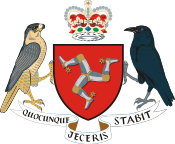 |
|---|
The Staff of Government Division of the High Court of Justice (usually shortened to Staff of Government Division) is the Court of Appeal in the Isle of Man. It hears all appeals, both criminal and civil, from the High Court. It is the second highest court in the Isle of Man with final appeal going to the Judicial Committee of the Privy Council acting as 'The King in Council'.
Contents
The judges of the Staff of Government Division are the First Deemster and Clerk of the Rolls, the Second Deemster, the Judge of Appeal and any other English King's Counsel who are appointed as acting deemsters to hear an appeal.